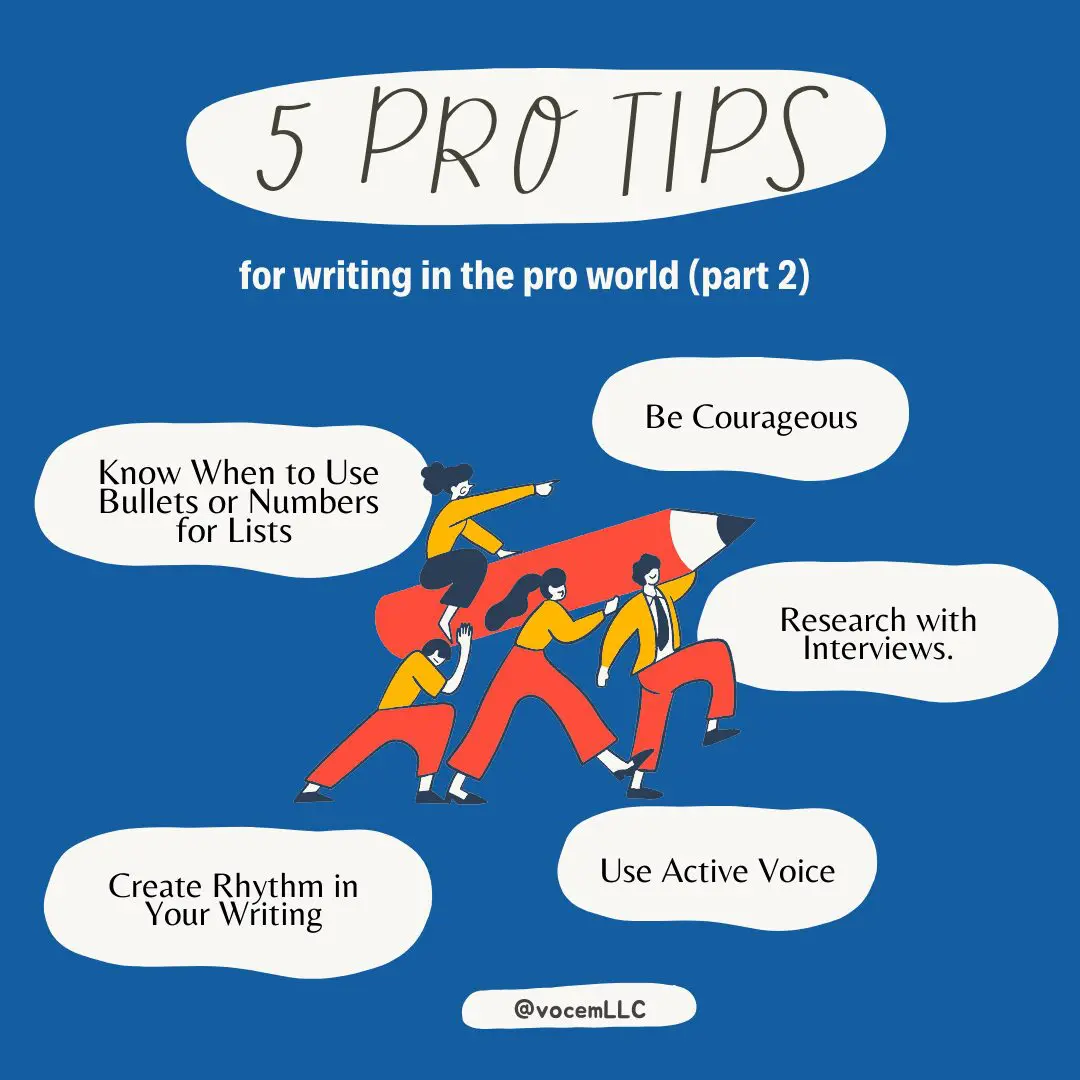
Enlightened Leadership Blog | Pro Tips for Writing Well in Your Pro World (Part 2) | October 2024
In this month’s post, we dive back into the pool of pro writing tips for professionals: business owners, entrepreneurs, and other leaders. (Revisit Part 1 here)
No matter what kind of leader you are or the industry in which you work, writing is a frequent activity, used to inform, instruct, inspire, and initiate. Whether via email, social media post, newsletter, ad copy, or blog post, short-form writing can impact those who read it and respond. And that’s what leaders want: engagement. So we’re back, this October, to offer a few more writing techniques that professionals and leaders can use to level up their short-form written communication.
5 Additional Pro Tips*
1. On Using Active Voice – Many rules in writing are made to be broken. However, there is one writing rule worth following to the T: favoring the active voice. In the active voice, the subject (noun) performs the action (verb): “Sometimes copywriters break the rules.”
In contrast, in the passive voice, the action’s target (the rules) is made the focus of the sentence and acts upon the noun (copywriters): “Sometimes the rules are broken by copywriters.”
Why does this matter?
For your readers, the active voice is simpler and easier to read. The passive voice is clunky and awkward. According to levelupyourgrammar.com, readers comprehend active voice sentences 40% faster than passive voice sentences. For the writer, the active voice enhances clarity, and you’ll get style points by reducing unnecessary words. Your writing is stronger because you can use “power verbs” rather than “being verbs” (e.g., was, is, are, were). And, according to the same website, writers earn a 27% higher perceived credibility rating for active voice.
2. On Writing Lists – When should short-form writers use bullets vs. numbers when they include lists in their pieces? Use a simple test: Is there a sequence or order to your list? Or have you included meaningful numbers in the preceding paragraph or the introduction to the list? If so, use numbers. If there is no order to the items and changing the sequence does not affect the meaning or make the list difficult to understand, use bullet points.
3. On Courage – Courage is a choice. Stand firm on what you want to write. Don’t let fear win. Write scared if you have to. The best writing—the stories and ideas that make the biggest impact—is born from courageous vulnerability and the willingness to write what’s unexpected, even what might cause division. Do it anyway. If you’re the leader, lead, including in your writing.
4. On Research – Research typically elicits images of search engines, industry articles, and books. Don’t forget about interviews. People can, and perhaps should, be your greatest asset when it comes to researching ahead of writing. Experts provide insights, stories, and data that can help you craft something compelling about a topic you may know little to nothing about.
5. On Creating Rhythm – Crafting sentences with words is like writing music. Where notes create melodies and rhythm, so, too, do words. And like with music, when steeped in emotion, words written with intentional rhythm, a rise and fall, like a wave, elicit emotional responses from readers. By mixing very short (VS) and long sentences between regular sentences, in just the right cadence, writers create these waves—and coax readers to speed up or slow down, which produces drama. The craft of excellent writing begins with learning how to write these very short sentences (VSSs). VSs speed up the story and can create suspense, build tension, or present sudden events. Well-placed VSSs grab the readers’ attention like the sudden pounding of a drum. Just don’t overuse VSSs or the writing will sound choppy.
There you have them: five pro tips to get you writing inspirational, impactful short-form pieces (blog posts, newsletters, emails, ad copy, etc.) that will draw readers in and coax them to take action.
Write on, fellow entrepreneurs.
By Cortney Donelson
Note: Many of these tips were first posted on Cortney’s writing services business’s social media pages (vocem LLC) and have been repurposed for this blog. Image credit: Canva.
Cortney Donelson is the owner and principal writer at vocem, LLC, a writing services business offering editing and ghostwriting services to give voices to stories that matter. Learn more at www.yourvocem.com.

